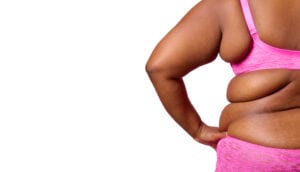America’s Centers for Disease Control and Prevention, the nation’s health protection agency, has declared that obesity significantly worsens Covid-19 outcomes. According to its website, obesity reduces immune function, decreases lung capacity, may make ventilation more difficult, and generally exacerbates the severity of Covid. During the first eight months of the pandemic, the CDC reports, at least three in ten Covid hospitalizations were attributed to obesity. As BMI (body mass index) rises, so do Covid-related risks of hospitalization, intensive care admission, mechanical ventilation, and death.
These are grim facts, particularly so as the CDC also reports that obesity is on the rise, especially amongst America’s poorest, and has been made worse by lockdowns. The highest prevalence of self-reported obesity is among “non-Hispanic black adults,” at a whopping 39.8 percent percent. Nearly four out of ten black Americans are not just overweight, but obese.
One might expect that in the name of saving lives, a national conversation about reducing obesity would be underway. The CDC website emphasizes the need for “culturally tailored interventions to address poor nutrition, physical inactivity, and tobacco use.” It advises obese adults to limit calories, choose leaner meats and vegetables, engage in regular activity, and reduce alcohol.

In the Covid red zone.
Yet as Michael Fumento recently pointed out in “Obesity: Covid’s Third Rail,” the average person would hardly know of the link between Covid severity and obesity from mainstream reporting, which has largely either remained completely silent about the connection or even denounced those who point it out. “It seems we’ve seen a backlash to linking Covid-19 to obesity without ever seeing the lash,” he notes wryly.
Fumento is the author of a book about obesity, The Fat of the Land, that devotes a chapter to the popular myth that one can be fat and healthy at the same time. He deplores the tendency to denounce discussion of obesity as more debilitating than obesity itself, noting that “NBC News devoted a long print story to shaming “fat shamers,” but provided no evidence that they even existed beyond an oblique reference to social media trolls.”
Thanks in large part to a social justice interdiction against what has come to be called “fat shaming,” it is now unacceptable to address the health effects of obesity. Some health officials even claim that so-called “fat shaming” is worse than being fat. A 2018 article in the peer-reviewed medical journal BMC Medicine targeted weight “stigma” as the main driver of the current obesity epidemic, finding “compelling evidence that weight stigma is harmful to health over and above objective body mass index.” The article’s authors were particularly concerned about anti-fat bias amongst health practitioners.
Stigma and bias are still acceptable in mainstream discussions, of course—just not against the fat. During a pandemic rife with slogans about being “in this together,” divisive shaming tactics have become standard fare in much reporting. In early April of 2020, the Huffington Post’s Richard Stokoe eagerly fueled evidence-free animus by declaring that “The White Male is the Biggest Risk in Spreading the Virus.” Allegedly, white men’s “privilege” and “toxic masculinity” made them less likely to follow health guidelines or care about the safety of others.
A year later, the specific issue was different but the scapegoating impulse was the same in an April 5, 2021 New York Times article on “How White Evangelicals’ Vaccine Refusal Could Prolong the Pandemic.” This piece of fear-mongering claimed that due to their alleged anti-science prejudices and other irrational objections—none of which were presented as having even a shred of credibility—evangelical whites posed a threat to American national health. The article skipped quickly over the possibility of vaccine refusal by non-white evangelicals.

Toxicity, thy name is white manhood.
Discussion of coronavirus impacts has often been indistinguishable from invidious identity politics. An April 4, 2020 article in the New York Post, “Why Women are Better than Men at Defeating the Coronavirus” showcased a cartoon image of a Super Woman flexing her muscular body next to a 98-pound male weakling. The article sounded a note of unmistakable crude triumphalism in emphasizing women’s greater ability to fight infection, and lesser chance of dying from Covid, due to their XX chromosome.
The tone was very different just a few days later, on April 7, when the New York Times reported that “Black Americans Face Alarming Rates of Coronavirus Infection in Some States.” The subheading noted that even in the absence of sufficient data to draw firm conclusions, the potential that black people were dying at higher rates than whites was worth discussing with “alarm,” and alleged that black infections and deaths illustrated entrenched social inequalities.
An article on the same day in The Washington Post titled “The Coronavirus is Infecting and Killing Black Americans at an Alarmingly High Rate” quoted Donald Trump calling the statistics “terrible,” Anthony Fauci referring to the racial disparity as “unacceptable,” and Surgeon General Jerome Adams saying it broke his heart to hear about higher death rates in the black community.
Reading these latter articles, one would never know that higher rates of obesity in black communities has certainly played a role in the death figures. For when it comes to talking about obesity, nothing that might remotely be seen to cast blame, or even simply to identify concern, is allowed. At a time when being overweight means undeniably greater risk from Coronavirus, it has become near-impossible to talk about the problem.

Whom we don't don't about when we don't talk about it.
Fumento notes that obesity “has long been politicized.” But the particular ferocity of contemporary reality-denial would have been impossible without the concerted efforts of activist academics, who bear the largest share of responsibility for our present impasse. Thanks to the social sciences’ craze for extreme constructivism, which denies biology and insists that society “constructs” reality, alongside a cultural-Marxist imperative, fat is now considered a category of oppression rather than a medical condition.
What began in 1978 with Susie Orbach’s bestseller Fat is a Feminist Issue, which argued that a sexist society makes women and girls hate their bodies, is now an entire area of identity studies called Fat Studies, complete with its own social justice terminology and a zealously-held ethical mandate to liberate the “stigmatized” from the prison of body-shaming.
According to the practitioners of "fat studies," bias against fat people is a human rights issue of equal importance to racism, and is expressed in countless micro-aggressions, including even the kindest and least aggressive of warnings or encouragement about weight-related health.
Fat studies’ shocking divorce from reason was strikingly illuminated in a 2016 article by three North American academics with expertise in psychology and health. “Scientific Weightism: A View of Mainstream Weight Stigma Research Through a Feminist Lens,” co-written by Rachel Calogero, Tracy Tylka, and Janell Mensinger, begins from the now-widespread premise that fat stigma, rather than obesity itself, is the real killer. The authors go so far as to deny that there are any negative health consequences of obesity, insisting that although there are correlations between obesity and disease, correlation is not causation. They also deny that obesity is a condition within an individual’s power to control or modify.

A social-justice issue, in the flesh.
“Weight stigma is a social justice issue,” the authors assert, “because people who are fat are denied their basic civil rights in every aspect of their lives, including their right to be fat and to live free of unfair treatment.” Merely to allege that obesity is medically harmful or undesirable is an example of “unfair treatment” that the authors believe should be outlawed. “It is absolutely essential,” they conclude “that scholars campaign for formal legislation to protect against weight stigma and discrimination.” Such legislation does not yet exist, but a powerful cultural consensus now denounces those who break the taboo against “fat-shaming.”
Even the CDC, though stating the negative health effects (and causes) of obesity unequivocally, has been affected by fat studies’ social justice cant. The website tends to speak about “having obesity” rather than “being obese,” as if obesity were an illness that one could catch unawares. It also frequently soft-pedals the direct connection between individual behavior and obesity, preferring a narrative of group deprivation, as when it alleges that “racial and ethnic minority groups have historically not had broad opportunities for economic, physical and emotional health, and these inequities have increased the risk of getting sick and dying from Covid-19 for some groups.” Such language reinforces the idea that the morbidity of the obese has more to do with oppression by others than with individual choices.
But at least the CDC actually names obesity as a problem. Many other outlets have remained silent, deliberately rejecting the opportunity to educate the public on a crucial health problem. At a time when many in our society exhibit a near-hysterical concern for safety at any cost, it is bizarre to see our cultural mandarins refusing to provide basic life-saving information.
Article tags: CDC, Covid-19, cultural Marxism, fat shaming, fat studies, obesity
My only gripe with this article is that sugar is worse than fat with regard to food. I think that’s what we’ve learned more recently. Sugar is in everything we eat today. Aside from the general reduction in physical work, the increase of sugar in the average diet is the biggest change between historical diets and the modern diet. I think fat content has been more consistent.